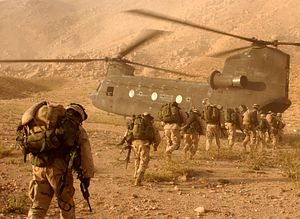This weekend, U.S. Marines and British forces in Afghanistan formally ended their combat operations in Afghanistan. The event was sealed with the formal transfer of two military bases in Afghanistan’s Helmand province to the Afghan National Army’s 215th corps. The two camps, Bastion and Leatherneck, were both used by the International Security Assistance Force (ISAF) to stabilize Helmand and Nimroz provinces as part of Regional Command Southwest, an ISAF administrative region. According to reports, remaining U.S. Marines and British forces in Helmand will maintain security for the two former NATO facilities through the end of the year.
NATO and U.S. forces in Afghanistan will withdraw completely from the country by the end of this year. A small contingent troop presence will stay on in Afghanistan to train members of the Afghan National Army and to conduct limited counter-terrorism operations under the Bilateral Security Agreement (BSA) and Status of Forces Agreement (SOFA) signed at the end of September with the new Afghan government under President Ashraf Ghani.
As international forces pull out of Afghanistan’s Helmand region, reports emerged last week that Nawzad district in the province’s south faced the “possibility of … collapse and takeover by the Taliban.” Local government officials in Helmand have stressed that the government needs to deploy additional troops to Nawzad or risk the area being overrun with Taliban insurgents. The current Afghan National Security Forces (ANSF) presence in Nawzad is proving inadequate to suppress the insurgent threat. “It’s no secret that the security situation is really bad,” notes the governor of Nawzad district. “We only have control over the official district building and some small areas.”
Meanwhile, on Afghanistan’s eastern front, Pakistan’s ongoing Zarb-e-Azb campaign against the Tehreek-e-Taliban Pakistan (TTP) — the Pakistani branch of the Taliban — has led the group to set up “new sanctuaries” on the Afghan side of the porous border between the two countries. Officials fear that the TTP could regroup in Afghanistan, posing a threat both to Afghanistan’s national security and to the stability of the Afghanistan-Pakistan border. Pakistan and Afghanistan continue to face a trust deficit that inhibits counter-terrorism cooperation between the two sides along their troubled mutual border. The new unity government under Ashraf Ghani and Abdullah Abdullah has not made changing the security situation on the border a priority.
Complicating the security situation in Afghanistan considerably, the timing of the withdrawal of international forces coincidences with Afghanistan’s transition from one central government to another. In general, the Afghan government has done poorly at projecting control over the country’s outlying districts during ongoing withdrawals of international forces (at least, according to one report by the International Crisis Group). The coming months will test the new Afghan government’s ability to consolidate power at a time when the security situation in Afghanistan enters a period of relative flux and uncertainty.
































